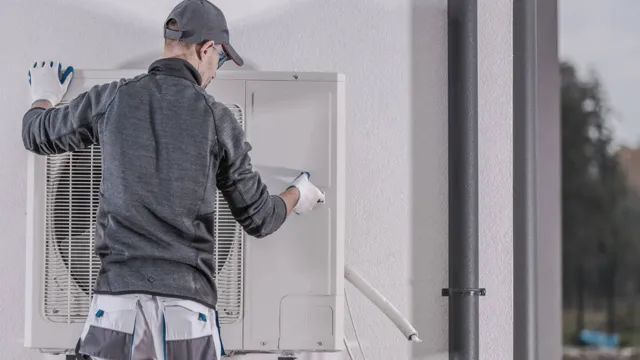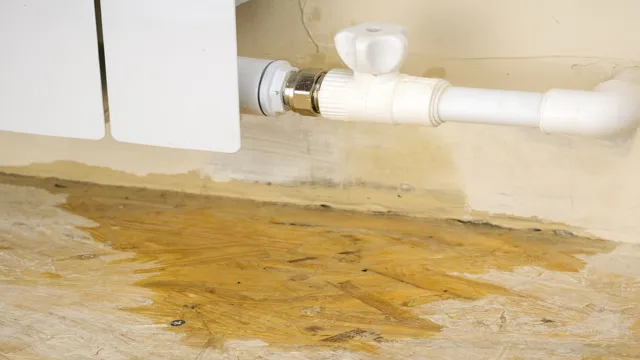Are you having trouble with your heat pump and noticing water leaking? This could be a problem that needs to be addressed ASAP. Water leakage from a heat pump can indicate numerous underlying issues. Not to worry, we’re here to help you understand the causes and explore potential solutions.
In this blog, we’ll guide you through the possible reasons why your heat pump is leaking water and how to solve them. Let’s get started!
What is a Heat Pump?
A heat pump is a heating and cooling system that operates through the transfer of heat from indoor and outdoor air. When a heat pump is leaking water, it is often due to a clogged or broken condensate drain line. This drain line is responsible for removing excess water that is produced during the cooling process.
If the line becomes clogged or damaged, water can accumulate and eventually leak from the heat pump. A professional HVAC technician can diagnose the issue and replace the drain line if necessary. It is important to address a leaking heat pump promptly, as this can lead to damage to surrounding areas and potential mold growth.
Regular maintenance can also help prevent clogs and prolong the life of the heat pump system.
Heating and Cooling System that Moves Heat
A heat pump is a heating and cooling system that moves heat from one place to another. Unlike traditional furnaces and air conditioners, which use fuel or electricity to create heat or cold air, heat pumps use electricity to transfer heat. They are essentially air conditioners that can work in reverse, absorbing heat from the outside air in the winter and releasing it into your home, and then absorbing heat from your home and releasing it outside in the summer.
Heat pumps are becoming increasingly popular because they use less energy than traditional heating and cooling systems, which can save you money on your utility bills. Additionally, they are more environmentally friendly because they do not rely on fossil fuels. Overall, a heat pump is a great option for homeowners who are looking for an efficient and sustainable heating and cooling system.

Why is My Heat Pump Leaking Water?
If you’ve noticed your heat pump leaking water, don’t panic. It’s actually a fairly common issue and there are a few possible reasons why it’s happening. One of the most common causes is simply excess condensation.
As your heat pump works to extract heat from the air or ground, it produces condensation that needs to be drained away. If there’s a blockage in the drain line or if the condensate pump is malfunctioning, you may notice water pooling around your unit. Another possibility is that there’s a refrigerant leak.
Refrigerant is usually held within a closed system, but if there’s a leak, water may appear as a byproduct. It’s important to have this inspected and fixed by a professional, as refrigerant leaks can be dangerous. Lastly, if your heat pump is nearing the end of its lifespan, it may be experiencing general wear and tear that’s causing leaks.
No matter the cause, it’s always a good idea to have a professional inspect and repair the issue to prevent further damage.
Condensation Buildup in Humid Weather
Heat pump If you’ve noticed water leaking from your heat pump during humid weather, the culprit is likely condensation buildup. Heat pumps work by extracting heat from the air, cooling it down, and then distributing it throughout your home. During humid weather, the heat pump can struggle to remove excess moisture from the air, leading to condensation buildup on the evaporator coil.
This can eventually lead to water leaking from the unit and causing water damage to your home. To prevent this from happening, it’s important to have your heat pump regularly maintained by a professional. They can clean the evaporator coil and ensure that the unit is functioning properly.
Additionally, using a dehumidifier in your home can help to reduce moisture levels and prevent condensation from forming on your heat pump. So, if you’ve noticed water leaking from your heat pump, don’t ignore it – contact a professional to have it inspected and repaired before it causes any further damage.
Blocked or Damaged Condensate Drain Pan
If you notice water leaking from your heat pump, the most likely culprit is a blocked or damaged condensate drain pan. Over time, this pan can become clogged with debris, causing water to build up and overflow. Additionally, if the pan is cracked or damaged, water may leak out.
If you suspect a blocked or damaged drain pan is causing your heat pump to leak, it’s important to address the issue promptly to avoid any potential damage to your system. A trusted HVAC professional can inspect your system, clean the drain pan, and make any necessary repairs. By taking care of your heat pump and addressing any issues as soon as they arise, you can enjoy reliable heating and cooling all year-round.
Don’t ignore a leaky heat pump – take action today to keep your system running smoothly.
Broken or Clogged Condensate Drain Line
If you notice water puddles around your heat pump unit, chances are you have a condensate drain line clog or breakage issue on your hands. Heat pumps work by transferring heat from one area to another, and in the process, they produce condensate that must be drained away from the unit. If the main or auxiliary drain line gets clogged or damaged, the water will accumulate in the unit and eventually overflow onto the floor.
Regular inspection and maintenance of your heat pump’s drainage system can prevent these leaks from happening. Be sure to call a professional technician if you suspect a clogged or broken condensate drain line to prevent damage to your unit and home.
What Can I Do to Fix the Problem?
If you find that your heat pump is leaking water, there are a few things you can do to fix the problem. First, check the drain pan beneath the unit to see if it’s full of water. If so, start by removing the excess water and cleaning out any dirt or debris that may be blocking the drain.
Next, make sure the condensate drain line is properly connected and not clogged. You can use a wet/dry vacuum to clear out any build-up or a pipe cleaner to clean the line. If none of these solutions work, it’s time to contact a HVAC professional for assistance.
In some cases, a leaking heat pump may be an indication of a bigger problem that requires expert attention. Remember to perform regular maintenance on your heat pump to prevent future leaks, such as cleaning or replacing air filters as needed. By taking care of your heat pump, it will function smoothly, efficiently, and safely for years to come.
Clean or Replace Dirty Air Filter
If you’re wondering what to do to fix your air conditioning system, one of the first things you should check is the condition of the air filter. Dirty air filters can reduce the efficiency of your system, leading to higher energy bills and potentially even damaging the equipment. Fortunately, fixing this problem is often as simple as cleaning the filter or replacing it entirely.
To do this, start by turning off your AC unit and locating the air filter panel, which is often on the side or bottom of the unit. Remove the filter and inspect it for dirt and debris. If it’s dirty, clean it by gently shaking or brushing off the dust.
If it’s clogged with dirt or debris, however, you’ll need to replace it altogether. Repeat this process every 1-3 months to keep your system running smoothly. By taking this simple step, you’ll not only save money on your utility costs but also improve the air quality in your home.
Clean and Unclog the Drain Pan and Line
One of the most common causes of AC leaks is a clogged drain pan or line. Fortunately, solving this issue is relatively simple. Firstly, locate the drain pan, which is typically situated below the indoor AC unit.
Next, remove any debris or standing water from the pan using a towel or sponge. Once the pan is clean, locate the drain line and use a wet-dry vacuum to suck out any blockages, debris, or buildup that may be causing the clog. Alternatively, you can use a regular vacuum cleaner and attach it to the drain line.
You may also try pouring a mixture of vinegar and hot water down the drain line to dissolve any buildup or blockages. A clogged drain line can cause significant damage to your home, so it’s essential to address the issue promptly. By performing routine maintenance on your AC unit, you can prevent leaks and extend the lifespan of your system.
Schedule a Professional Inspection and Maintenance
If you’re experiencing problems with your HVAC system, the best thing to do is schedule a professional inspection and maintenance. There are several things you can do to fix the problem, but a professional will be able to diagnose the issue and provide a long-term solution. They’ll check for any leaks, blockages, or damaged components that may be causing the issue.
They’ll also clean and replace any filters or parts that are worn out or dirty. By having regular maintenance and inspections done, you can prevent problems from occurring in the first place and extend the life of your system. It’s important to remember that HVAC systems aren’t something you should try to fix on your own, as they can be dangerous and complicated.
Let a professional handle it, and you’ll have peace of mind knowing that your home’s heating and cooling system is in excellent working condition.
Conclusion: Taking Care of Your Heat Pump
In short, a heat pump leaking water is equivalent to a leaky faucet in your home – it’s simply not a sustainable situation. However, unlike a leaky faucet, diagnosing and fixing the issue with your heat pump may require the expertise of a professional technician. So, don’t wait until the problem becomes a flood – nip it in the bud and ensure your heat pump is operating at its optimal efficiency.
“
FAQs
What causes a heat pump to leak water?
There are several possible causes for a leaking heat pump, including a clogged drain line, low refrigerant levels, or a damaged condensate pump. It is recommended to have a professional diagnose and repair the issue.
Can a clogged air filter cause a heat pump to leak water?
Yes, a clogged air filter can restrict airflow and cause the evaporator coil to freeze. When the coil thaws, excess water may leak from the unit. Regular filter replacement or cleaning can prevent this issue.
How much water should a heat pump produce during operation?
A heat pump should not produce any visible water during operation. If water is visible or pooling around the unit, it is likely a sign of a leak or other issue.
What maintenance tasks can prevent water leaks in a heat pump?
Regular maintenance tasks, such as keeping the unit clean and clear of debris, checking and cleaning the drain line, and monitoring refrigerant levels, can help prevent water leaks in a heat pump. It is also recommended to have the unit professionally inspected annually.

